Can You Train a Senior Dog
Can you train an old dog?
This question is a tricky one because as our Fluffy Friends age, their needs and abilities change.
Among the various aspects of senior dog care, training often takes a backseat.
Yet, dog training is as important for senior pets as it is for their younger counterparts.
In today's post, we'll show you that you can train dogs of any age, including your senior canine companion!
Click the links below to go to that section:
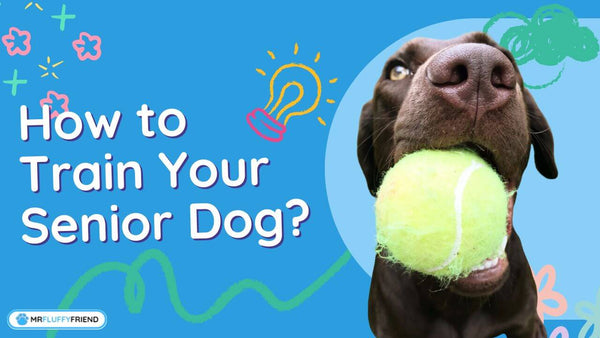
Understanding Senior Dogs
As dogs age, they may experience changes in behaviour and cognitive function.
This could include decreased energy levels, memory loss, or increased anxiety.
Understanding these changes helps in tailoring training methods to suit their specific needs.
Senior dogs may need adjustments to traditional training methods.
For instance, reward-based training can be effective in motivating an adult dog.
Additionally, shorter training sessions and gentle exercises help prevent fatigue and strain.
Dog owners should check the physical limitations and medical issues of their dog
For instance, arthritis or vision loss may affect a senior dog's ability to do some activities.
Additionally, senior doggies usually have hearing issues.
You need to check your dog's hearing before starting the training process.
You might need to use hand signals instead of verbal cues.
Thus, before embarking on a training program, try to assess these factors.
You can also consult with a veterinarian or a professional dog trainer.
Benefits of Training Senior Dogs
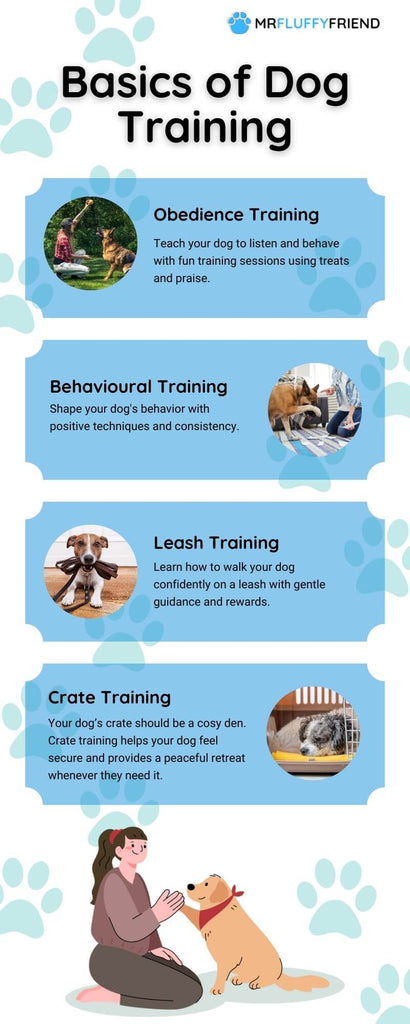
Mental Stimulation and Enrichment:
Training provides mental stimulation for your senior furry friend.
Learning new skills or revisiting familiar commands helps prevent cognitive decline.
Consider playing with treat dispensing toys.
These toys help keep them busy, relieve stress, and avoid boredom.
Strengthening the Bond Between Dog and Pet Parents:
Training sessions offer valuable opportunities for bonding between senior dogs and pet owners.
Positive interactions build trust and communication, strengthening the emotional connection between them.
Also, well-trained older dogs can interact with family members better.
Addressing Behavioural Issues:
Senior dog training helps address common behavioural issues like separation anxiety or aggression.
Teaching alternative behaviours and reinforcing positive habits promotes harmony within the household.
Related: Simple Tips To Improve Your Senior Pet’s Life
Tips and Training Techniques for Senior Dogs
Starting the Training:
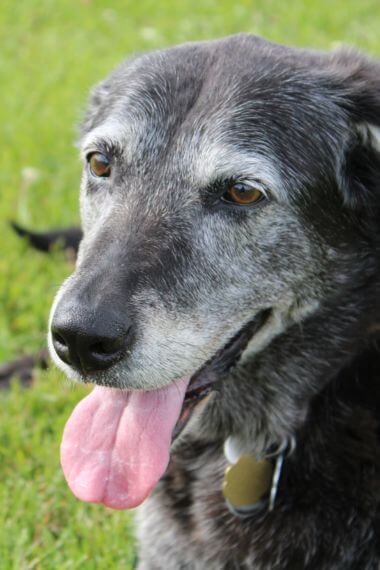
If you're adopting a senior fluff, don't expect them to learn immediately.
Allow your new dog some time to adjust to their new surroundings.
Remember that they could get anxious in a new place, especially if they've been in a shelter for a long period.
Before bringing your dog home, make sure you prepare the following:
- Organise your home - Uneasy canines may be destructive. It's a good idea to create a safe space for them to move without fear or discomfort. Keep fragile objects and valuables out of reach.
- Gather your supplies - Prepare training aids like leashes, harnesses, collars, and clickers.
- Treats, treats, and more treats - Remember to buy small treats. Dog training success depends on rewarding positive behaviour! Thus, have a stock of delicious goodies on hand.
- Prepare a resting area - Older dogs get tired fast. Ensure that they have their orthopaedic pillow close by. A comfy blanket also helps keep them cosy.
Setting Realistic Goals:
Set realistic training goals based on your senior dog's abilities and physical limitations.
Celebrate progress, no matter how small, and adjust expectations.
Be patient and consistent in your training efforts with senior dogs.
Establishing a Routine:
Set up a consistent training routine with sessions tailored to your dog's needs.
Seeking Professional Guidance if Needed:
If you encounter challenges, seek guidance from a certified dog trainer or behaviourist.
They can offer personalised advice and techniques to address specific issues.
Positive Reinforcement Methods:
Use positive reinforcement techniques.
Give special treats, plenty of praise, and chew toys to motivate and reward your dog.
This approach fosters a positive learning environment and encourages desired behaviours.
Related: Signs To Put Your Dog To Sleep
Frequently Asked Questions
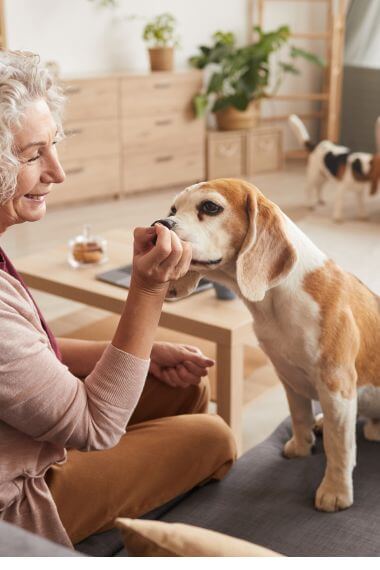
Training an older dog can come with its own set of challenges and considerations.
Here are some FAQs that often arise when training an older dog:
1. Is it too late to train my older dog?
No, it's never too late to train a dog!
While older dogs may have established habits, they can still learn new behaviours!
2. What training methods are best for older dogs?
Positive reinforcement methods are generally recommended for older dogs.
Don't use physical punishment!
3. How do I deal with existing behaviour problems or bad habits?
Identify the underlying reasons for the behaviour problems and address them.
Consult a professional trainer or behaviourist to develop a tailored training plan.
4. How do I teach basic commands to an older dog?
Start with basic commands like sit, stay, come, and leash walking.
Use consistent cues and rewards to reinforce desired behaviours.
After some time, increase the training difficulty.
5. How do I handle health issues during training?
Be mindful of your dog's physical limitations.
It's always a good thing to have a general check-up before training.
6. How long should I train to see results?
The time it takes to see results varies.
Results usually depend on the individual dog.
7. Should I enrol my older dog in obedience classes?
Obedience training can be beneficial for older dogs.
These classes provide structured training sessions and socialisation opportunities.
Choose classes that cater to the specific needs and abilities of older dogs.
8. What if my older dog has cognitive decline?
If your older dog is often confused or disoriented, consult your vet for guidance.
Adjust training methods and routines to accommodate their changing needs.
Always provide mental stimulation and support.
Related: Should My Senior Dog Have Surgery?
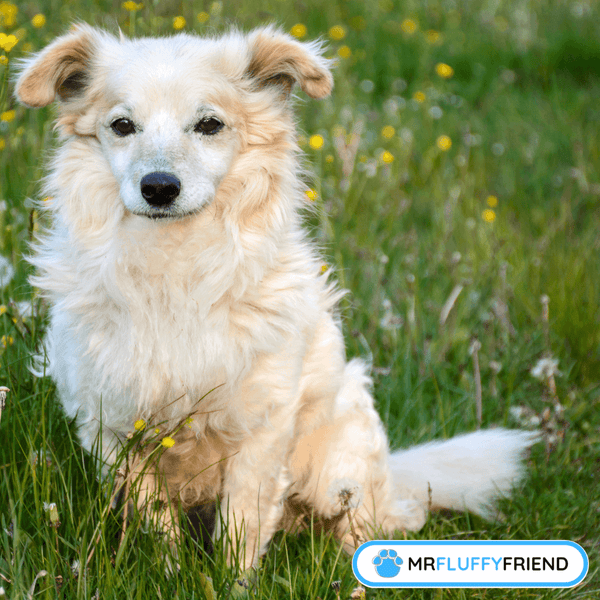
Conclusion
Every dog is unique, so tailor your training to fit their personality and needs.
Consistency, patience, and positive reinforcement are key.
Whether you have a young pup or a senior dog, these principles apply.
Consistency provides clear guidance, while patience allows for learning at their own pace.
Positive reinforcement motivates good behaviour and strengthens your bond.
Regardless of what the old adage says, it's never too late to teach an old dog new tricks!
Looking for some products that could help you out?
Check out our Online Shop!
Here are some useful products in relation to this blog post:
MrFluffyFriend - Carrot Snuffle Toy
MrFluffyFriend - Customizable Powerharness
MrFluffyFriend - Adjustable Dog Collar
MrFluffyFriend - Orthopaedic Pillow
MrFluffyFriend - Anxiety Relieving Fluffy Pet Blanket
